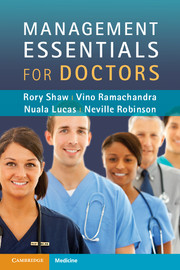Book contents
- Frontmatter
- Contents
- Contributors
- Foreword
- Preface
- Acknowledgements
- Section 1 Core knowledge
- Section 2 Core skills
- Section 3 Important bodies
- Chapter 19 General Medical Council
- Chapter 20 National Clinical Assessment Service
- Chapter 21 National Confidential Enquiry into Patient Outcome and Death
- Chapter 22 National Institute for Health and Clinical Excellence
- Chapter 23 Postgraduate Medical Education and Training Board
- Section 4 Information, evidence and research
- Section 5 Money
- Section 6 NHS structures
- Section 7 Operations
- Section 8 Safety and quality
- Section 9 Staff issues
- Index
- References
Chapter 19 - General Medical Council
Published online by Cambridge University Press: 05 March 2012
- Frontmatter
- Contents
- Contributors
- Foreword
- Preface
- Acknowledgements
- Section 1 Core knowledge
- Section 2 Core skills
- Section 3 Important bodies
- Chapter 19 General Medical Council
- Chapter 20 National Clinical Assessment Service
- Chapter 21 National Confidential Enquiry into Patient Outcome and Death
- Chapter 22 National Institute for Health and Clinical Excellence
- Chapter 23 Postgraduate Medical Education and Training Board
- Section 4 Information, evidence and research
- Section 5 Money
- Section 6 NHS structures
- Section 7 Operations
- Section 8 Safety and quality
- Section 9 Staff issues
- Index
- References
Summary
Role of the GMC
The General Medical Council (GMC) registers doctors to practise medicine in the UK. Its statutory purpose is to protect, promote and maintain the health and safety of the public by ensuring proper standards in the practice of medicine. The GMC has four distinct functions under the Medical Act 1983.
Keeping up-to-date registers of qualified doctors – the register is made available to employers and the general public so the registration of doctors can be verified
Fostering good medical practice – the GMC issues a range of guidance aimed at promoting high standards of care
Promoting high standards of medical education – this is achieved by setting standards for medical schools and, together with the Postgraduate Medical Education and Training Board (PMETB), for postgraduate training programmes. The GMC also encourages doctors to keep up to date through continuous professional development
Dealing firmly and fairly with doctors whose fitness to practise is in doubt.
The GMC was established under the Medical Act of 1858. It is a registered charity in England, Wales and Scotland. The governing body, the Council, has 24 members, of which 12 are doctors and 12 are lay members, all appointed by the Appointments Commission. As a UK-wide body, the GMC regulates doctors registered in all four countries of the UK and has devolved offices in Belfast, Edinburgh and Cardiff. The GMC also cooperates with a variety of other regulators and organizations representing patients and doctors. Niall Dickson, a former BBC journalist, editor of Nursing Times and chief executive of The King's Fund, joined the GMC as chief executive and registrar in January 2010.
- Type
- Chapter
- Information
- Management Essentials for Doctors , pp. 53 - 55Publisher: Cambridge University PressPrint publication year: 2011



